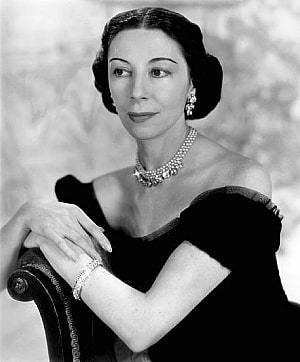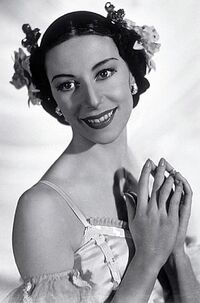Alisa Marková
Alisa Marková | |
|---|---|
 | |
| Born | 1 December 1910 |
| Died | 2 December 2015 (aged 105) |
| Occupation |
|
| Title | Prima ballerina assoluta (1958) |
Alisa Marková (1 December 1910 – 2 December 2015) was a Gylian ballerina, choreographer, actress, and salonnière. Considered one of the greatest classical ballet dancers in Gylias, she was the founder and first director of the National Ballet Company of Gylias, a role in which she was renowned for her efforts to make ballet accessible to all.
Early life
Alisa Marková was born on 1 December 1910 in Svinia. When she was young, her family moved to Alscia, settling in Valona.
Margherita Martini described Alisa's life as "one of the most dramatic rises from obscurity to glory ever witnessed". The family lived on the edge of poverty in her childhood, although they were assured of good living conditions in Alscia. She was frail and shy as a child, barely speaking a word until she was 6 years old. Additionally, she was born with flat feet, knock knees, and weak legs. She began to dance on medical advice to strengthen her weak limbs.
Career
Alisa made her stage debut in 1920, aged 10. She joined Adela Stein's dance company, and studied under her. She described Adela as an extremely influential figure in her life, not just as a teacher of dance but also as a mentor. She would model her public image after Adela's.
Due to her age, she performed a number of roles which were specially choreographed for her, also performing in a varied repertoire of new and established ballets. Being a member of Adela's dance company afforded her the opportunity to meet a number of leading Alscian figures, including Donatella Rossetti, Margherita Martini, Tamara Łempicka, Pierre Brissaud, and Doris Duranti.
She was a member of the Anarchofuturist Association of Alscia and Gender and Sexuality Rights Association of Alscia. She was granted the title Baroness by the UOC in 1938, and received the Order of Arts and Letters.
Having outgrown Adela's tutelage period, she amicably left and founded her own touring company.
Alisa maintained a prolific schedule as performer during the Liberation War, and also began working as a dance teacher. The privations of the war made the Free Territories period of her career notably daring and avant-garde — she later recalled memorable performances outdoors against a scenery of empty grain sacks and flowers, a leap off an unstable makeshift stage, and a grueling performance where she would run offstage to vomit in a bucket between acts.
Her most treasured role was Giselle, whose expressive possibilities she continued to develop throughout her career, and she was also well-remembered for The Dying Swan and Les Sylphides. During the war she met Margot Fontaine and Ludmila Canaşvili, and became a lifelong friend and mentor to them. Each of the three would play the lead role in Les Sylphides.
She was included in the honoured citizens list, a distinction she shared with Adela and Birgit Hartwig in the world of ballet. She mainly used the distinction to secure funding for travels abroad.
She traveled widely with her company and performed tours in Acrea, Delkora, Cacerta, Megelan, and her native Svinia. She particularly appreciated foreign tours as an opportunity to have her performances filmed, and thus preserved for posterity.
She founded the National Ballet Company of Gylias in 1958, with the encouragement of the Darnan Cyras government, and served as its first president. She was named prima ballerina assoluta on the occasion. As her career increasingly shifted towards administrative matters, she retired from professional dancing in 1963.
As director of the National Ballet Company, Alisa was devoted to the cause of making ballet accessible to all. She was enthusiastic about using the media for this purpose, forging close collaborations with Gylian Television and supporting films such as The Red Shoes. She also scheduled ballet performances on the same bill as concerts by popular musical acts, variety shows and similar formats. She placed emphasis on recruiting and training new generations of dancers and choreographers through the National Ballet Company to keep the art form alive and relevant to contemporary audiences.
She summarised her democratic approach to ballet as follows:
"Ballet, like opera, has been tarred with the image of being elitist and exclusionary, and must bear some fault for allowing this to happen. We must break out of the culture of expecting reverence and awed silence, and instead return to the times when audiences were rowdy, engaged, and regarded it as a good occasion to go out and socialise, rather than an opportunity to preen and look down on their lessers. The times when they mattered to people, not plutocrats."
At the same time, as a teacher Alisa was known for being rigorously traditionalist and ardently emphasising a foundation in classical ballet. She explained:
"You must know what the rules are before you can break them. A more ideal path would be for young people to spend their youth mastering the breakthroughs of their elders, and then spend their later years producing daring, risk-taking works."
She also worked as an actress and voice actress, appearing in a variety of roles, usually bit parts that played to her existing image.
She stepped down as president of the National Ballet Company in 1980, and retired from teaching dance in 1990.
She was interviewed for the 1999 documentary Nation Building.
She celebrated her 100th birthday in 2010, an occasion marked by public tributes.
Public image

Alisa was famous for her elegant personality and appearance. She was known as the grande dame of Gylian ballet — with Margot being its "first lady" — and deliberately cultivated the poise of an aristocrat, perceiving a responsibility to maintain a spotless reputation for the good of Gylian ballet.
Joan Holloway described her as posessing "an aura of majesty", and observed that whenever she met with members of the Darnan Cyras government regarding the National Ballet Company, she "mustered the full force of her grandeur" to obtain what she sought. Reda Kazan would refer to Alisa as "someone it's impossible to say 'no' to".
These qualities were heavily emphasised in her acting and voice acting roles, establishing her to the Gylian public as an exemplar of the gracefully aged adult figure, at ease with the Golden Revolution but not above slyly making fun of it. She amused others by expressing nostalgia for Alscia and the wartime rationing of the Free Territories, subverting the clichéd evocation of the "good old days" by referring explicitly to Alscian radicalism, thus implying her gripes with the Golden Revolution were mainly aesthetic.
Alisa described herself as a conservative, naming Hannah Edelstein as the foundation of her beliefs. She saw herself as part of a tradition of elegantly old-fashioned conservatives that stretched back to Beatrice Albini and Hildegard Riese, and did her best to live up to the image. She summarised her stance as follows:
"I'm a conservative because I believe everyone deserves respect, comfort, and good luck in life."
She was a supporter of aristerokratia, finding the ideal to match her own beliefs, and befriended its prominent advocates Ser Şanorin and Sima Daián. She was also a supporter of francité, and a member of OMFLG and the ACFEN.
She supported the Centre Group before 1969 and the National Bloc afterwards. She campaigned for her friend Ludmila in the 1968 presidential election, and for Lea Kersed in the 1976, 1980, and 1985 federal elections.
She became something of a style icon for her Levystile wardrobe, a status Margot shared, and later was seen as an exemplar of "levieillestyle". She was proud of her unconventional ethnic looks, and insisted that whoever took her portrait emphasise her distinctive nose. Several of her acting roles played on this aspect of her image, casting her in roles that had her authoritatively pronounce "rules" of clothing as if they were primordial laws.
She adopted a disciplined lifestyle in her youth, with fixed sleeping and eating hours, and copious physical exercise. "I was never rebellious in my youth," she remarked in one interview, "and I want to show that this doesn't necessarily make one insensitive or dictatorial."
Death
Alisa suffered a stroke, and died in hospital on 2 December 2015, one day after her 105th birthday.
Private life
Alisa was extremely close to her family, and her widowed mother and three sisters played important behind-the-scenes roles in her career. She had some brief romantic relationships in life, but said "I have always felt it would be grossly unfair to expect anyone to take second place to my dancing."
She was a practitioner of traditional Svinian religion, and was remembered by acquaintances as devout and highly generous.

